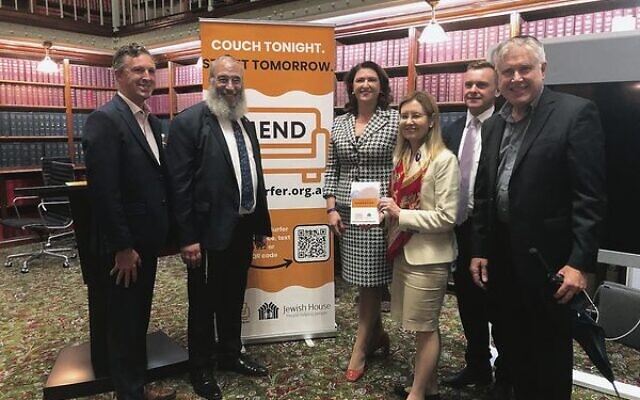Tackling hidden homelessness
To help tackle the issue of homelessness, Jewish House has launched an addition to the Mend strategy, providing free multi-lingual online and text support connecting couch surfers and their hosts to vital services.

ON any given night in Australia, more than 17,000 people are couch surfing.
A new campaign to shed light on this insidious form of homelessness was launched by Jewish House CEO Rabbi Mendel Kastel and NSW Minister for Families and Communities Natasha Maclaren-Jones at NSW Parliament House on Tuesday.
Couch surfing is often the first step towards homelessness and half of all couch surfers in Australia are under the age of 25. The majority are female, many fleeing domestic violence situations.
To tackle the issue, Rabbi Kastel has launched an addition to Jewish House’s Mend strategy, to provide free multi-lingual online and text support connecting couch surfers and their hosts to vital services.
There is also a handbook that provides examples of written agreements between hosts and couch surfers to ensure a better and safer experience for both parties.
“We’re doing a lot of work in the homeless space, particularly when we’re working in the community, and we see people that are couch surfing and how it goes wrong,” Kastel said.
“We recognise that it’s an important area that needs to be addressed, so we started doing our research to see how prevalent it is – what are the needs, what are the difficulties in it and how can we fill those needs and really make a difference.
“That’s been a couple of years of research in collaboration and consultation, which has brought us to where we are today.”
While Kastel was aware of the prevalence of couch surfing, he didn’t realise the extent people will go to find a place to sleep.
“When you think of couch surfing you think of staying at a friend’s place,” he said.
“People are going on dating apps to find a bed, or they are being taken advantage of through slave labour to be able to keep a bed. There was an article recently where someone was taking drugs in a couch surfing situation and died, so it’s a lot more serious and sinister that just having a couch.
“Also, this is possibly your last friend or family member and they’re going to make you homeless.”
The aim of the initiative is to provide early support and intervention, which could help prevent a couch surfer from devolving to more harmful forms of homelessness.
“I do want to commend Jewish House for the work they’re doing,” said Maclaren-Jones.
“By providing that handbook to support those who are looking after people in their homes, but also encouraging people to come forward so we can identify things that can be done.”

comments